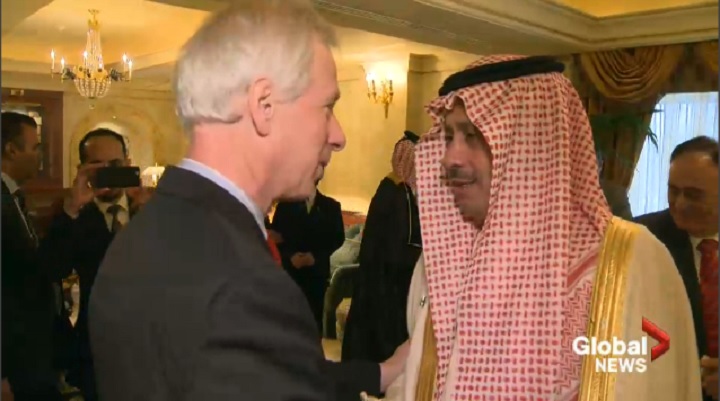Months after Global News and several other media organizations requested it under access-to-information legislation, Global Affairs Canada released its 2015 human rights report on Saudi Arabia.

But the department redacted everything in the report related to potentially contentious human rights issues.
READ MORE: Reality check: Why is Canada really moving ahead with the Saudi arms deal?
Virtually all of the redactions cite a section of the Access to Information Act that exempts anything that could hurt the Canadian government’s international relations.
Redactors also censored the most interesting part of the report. “Ongoing human rights challenges to watch for in the year:” a section begins. The next line and much of the following page are blacked out.

READ MORE: Federal government denounces mass executions in Saudi Arabia
Among the censored bits:
Information about the Jan. 2, 2016 death of prominent Shiite cleric Nimr al-Nimr, an outspoken government critic and a key leader of Shiite protests in eastern Saudi Arabia in 2011. He was executed following his conviction in Oct. 2014 of sedition and other charges and sentenced to death.

Some of the redactions read like cheesy cliffhangers: “Saudi Arabia is an absolute monarchy and “…?

Also censored is information about potential ISIS connections in Saudi Arabia, including Twitter accounts traced to that country.

It mentions “Reports of child, early and forced marriage,” saying it happens in the kingdom, but not that often.

Being gay is still illegal, but any comment on that matter is blacked out. More work is being done to help victims of domestic abuse, but further analysis on that point is also not for our eyes.

READ NOW: Saudi Arabia thanks Canada for helping Syrian refugees. But how much is it doing?

Get daily National news
Freedom of religion is also a no-go zone:

Some sections are entirely blacked out.

Global Affairs Minister Stephane Dion has come under fire for signing off on export permits for Light Armoured Vehicles Canada is selling to Saudi Arabia. The government’s own analysis has suggested these might be used in Yemen, where Saudi Arabia is accused of killing civilians indiscriminately.
With files from the Associated Press









Comments